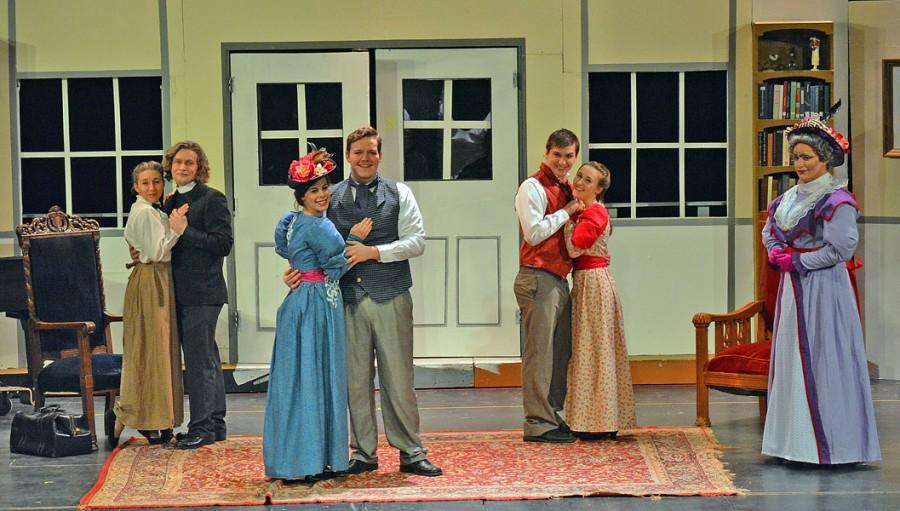A Wilde and earnest night of comedy in Dibden
L to R: Molly Burnett, Thomas Gunn, Rachael Garnjost, Cody Logan, Shawn Weibel, Athena Furioni, Joshua Baughn
The auditorium was filled with music reminiscent of the pre-dance socializing scenes found in Jane Austen films. The set, waiting on the stage for the actors to fill it with life, matched this theme, with its deep red color scheme and posh furniture.
“The Importance of Being Earnest,” written in 1894 by Oscar Wilde, tells the farcical story of two men who both use the name of “Earnest” as an alter ego, each romancing a different woman while doing so. The result is a “Twelfth Night”-esque tale of mistaken and revealed identities.
This 122-year-old play was brought to the Dibden stage as a collaborative senior project between Joshua Poland, Rachael Garnjost, and Shawn Weibel. It marked Poland’s first time directing.
After a brief moment of confusion when the stage lights went out and the house lights stayed on, the auditorium dimmed and the play opened with a rather long conversation between Jack “Earnest” Worthing (Cody Logan) and Algernon Moncrieff (Shawn Weibel). I found this scene difficult to follow initially, as both actors were speaking quickly and not all of their enunciations were clear. However, once the show got going, their body language and character immersion helped hugely and I was able to understand most of what was happening.
The play picked up with the introduction of Algernon’s aunt, Lady Bracknell (Joshua Baughn), and her daughter, Gwendolen (Rachael Garnjost). As Lady Bracknell interrupted the attempted engagement between “Earnest” and Gwendolen, Baughn’s performance — along with the brilliantly convincing work of the costume department — brought to life a hilariously assertive and socially-concerned woman of the late 1800s’ upper class who persisted as a highlight throughout the show.
A change in scenery brought the story from London to the country, where “Earnest” lived as Jack, guardian to the young Cecily Cardew (Athena Furioni). While reading in the garden, Cecily received news of a visitor, who turned out to be none other than “Earnest” Worthing, Jack’s “estranged brother.” However, the audience recognized that this was actually Algernon, taking up the mantle so that he might meet Cecily.
The garden scene set off the real conflict of the plot, and Jack soon arrived to learn of Algernon’s deception. The dramatic melancholy as Jack attempted to kill off his deceptive second life by announcing to Cecily’s tutor, Miss Prism (Molly Burnett), and the town preacher, Reverend Chasuble (Thomas Gunn) that his brother Earnest had died of a “severe chill” created a source for much humor. This was quickly followed up by the “dead” Earnest, who was never really Earnest at all, appearing from the house with a smitten Cecily by his side.
Gunn and Burnett fully inhabited their roles as the play’s flirtatious and elderly would-be couple, bringing an awkwardly entertaining chemistry to their subplot of the show.
During the show’s intermission, the three servants of the story (Patrick Monaghan, Sawyer Judkins, Samantha Gunn) stood by a table in the lobby, offering cucumber sandwiches to anyone kind enough to leave something in their donations jar. I learned that a piece of notepaper with “$100” written on it didn’t count, and thus was unable to obtain one as I had no actual cash on me.
Once the show returned from intermission, it set out to clear up all of the misunderstandings and conflicts that its first half had constructed. Cecily and Gwendolen learned that they were not engaged to the same person after all, and that, despite their identical loves of the name Earnest, neither of their beloveds actually possessed the name.
Furioni’s and Garnjost’s expressive portrayals of 1890s women were magnificently layered, showcasing their abilities to deliver a line that says one thing while clearly meaning something else entirely.
Having been found out in their fraudulence, Jack and Algernon held an intense argument in the garden, executed impressively through mouths full of tea cake by Logan and Weibel. Somehow, most of their dialogue was still coherent, and the result was hilarity.
By the end of the show, the characters had all achieved some kind of happiness. Algernon and Cecily were given the blessing of marriage by Lady Bracknell, upon the revelation that Cecily was sitting upon an inheritance of 130,000 pounds, because of course money is what’s most important in this world. After the discovery that Jack was, in fact, the long-lost son of Lady Bracknell’s sister, whose name was — shockingly — Earnest, Lady Bracknell gave him her long-withheld blessing to marry Gwendolen. The knowledge that they were now first cousins apparently had little impact on their love.
The set design (Andrew Tascarella) and costume design (Garnjost) both deserve a shout-out for their assistance in producing an immersive 1890s experience. In addition to the pre-show music (sound design by Ben Steele), the era was clearly presented and formed the backbone of context that was necessary for a proper understanding of the story.
“To me, theatre has always been an escape from reality into a new universe to explore. Much like Jack and Algernon . . . it’s a retreat from your personal life to learn who you are by becoming another person,” said Poland in his director’s note, offering his own philosophical outlook on the play. “Earnest delights in the improbable and revels in secrets, promises, and mischief. Yet, it is all done with the unmistakable charm and wit of Oscar Wilde that is, I believe, still unsurpassable. We have been given the opportunity to engage with you in your own inner Bunbury and to share with you just a bit of our own.”
On the whole, the play was well-executed and thoroughly amusing. Wilde’s clever wit shone through in the actors’ earnest performances, and provided some kind of answer to those pondering the age-old question: “What’s in a name?”






